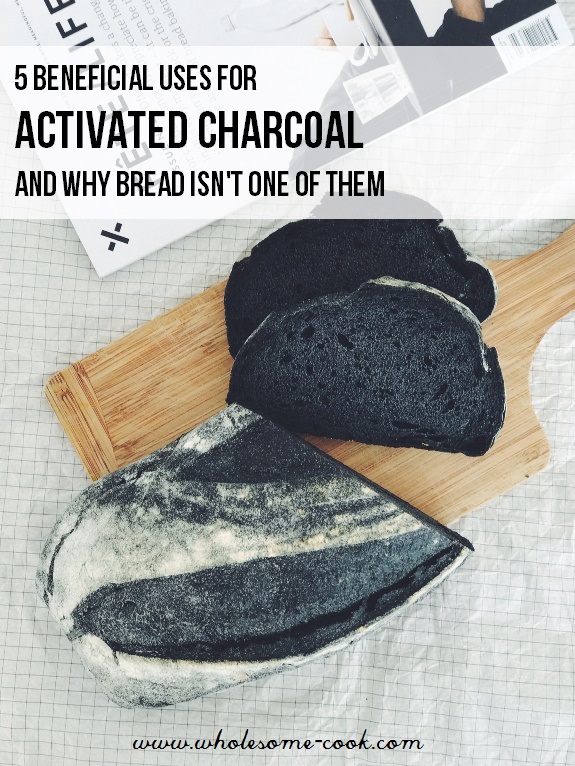Activated charcoal has been used for centuries for medicinal purposes. Lately, everything from water, bread, lattes and toothpaste contains it! So, what is activated charcoal? What are the benefits, its side effects and best uses for it?

What is activated charcoal?
Most activated charcoal (or activated carbon) products today come from charred coconut shells.
Activated charcoal works by the process of adsorption. Yes, adsorption, not absorption. Put simply, during this process, elements stick to it and are removed from the body. Think of dust sticking to a cloth, or pet hair sticking to a lint roller. This is of benefit, obviously, if you are trying to remove something undesirable. But not, when you are not… I explain that in the next paragraphs.
Here are 5 best uses for activated charcoal
- Teeth Whitening – there are many toothpastes and toothpowder products on the market with activated charcoal as the active (or only) ingredient. Having used My Magic Mud activated charcoal toothpaste I can say that it actually works – be careful when handling and brushing as activated charcoal can easily stain your clothes and grout.
- Relief of Intestinal Gas and Diarrhea– this has been the main purpose for activated charcoal before it became trendy. Activated charcoal can also be used in the treatment of diarrhea and food poisoning.
- Digestive Cleansing – in addition to its use in some instances of ingested poisoning.
- Water Filtration – used in most fridge water filters and many under-sink ones, activated charcoal helps to remove heavy metals and other impurities from tap water.
- Skincare – activated charcoal masks (I love this one) and skin scrubs are all the craze, and for good reason. They can help remove impurities from the surface of the skin as well as get rid of those pesky blackheads leaving it supple and reducing blemishes.
Best at home uses
You can keep activated charcoal tablets in your medicine cabinet. In fact, doctors in emergency rooms also use it to help remove orally ingested toxins from the body. Use them as a remedy for a number of digestive ailments. It can:
- assist with reducing gas and bloating.
- reduce the effects of over-indulging in heavy meals or excessive alcohol consumption.
- Doctors in emergency rooms also use it to help remove orally ingested toxins from the body.
- help when stricken by bouts of diarrhea.

Why activated charcoal should not be used in food
As the trend has emerged activated charcoal now appears in many food products. Everything from toothpaste, bottled water, fish and chips and activated charcoal bread… on purpose. To make them look black and hipster.
The issue with adding activated charcoal to drinks and food? It lies in the exact same properties that make the other uses so beneficial.
You’ve guessed it, adsorption!
What consumers may neglect to understand is that due to its adsorptive power, activated charcoal can interfere with the absorption of nutrients, supplements and prescription medications. This is why activated charcoal should be taken at least 90 minutes up to 3 hours prior or after meals, supplements and prescription medications.
So as #hipster as it may seem to sandwich your tempeh burger between two slices of activated charcoal bread or that fancy black brioche bun, bear in mind the digestive effects of this potent substance. In fact Italy is cracking down on the use of activated charcoal in bread!
This is why your activated charcoal fish and chips, Melbourne, is nothing but a trendy fad and has nothing to do with good nutrition. The same goes for drinking charcoal water with lunch.
Another #hipster invention that’s ‘gothic latte‘ is another food item containing activated charcoal. Better to stay on the side of caution when ordering these…
There, I said it.
Some of the links in this article make use of affiliate relationships. Thank you for your support.

3 comments
Wow, this is quite an eye-opening article. We can so easily fall for these trendy foods without even thinking. I guess research and everyting in moderation are good mantras to have. Thanks for posting this.
Charcoal is used in modern human and veterinarian medicine. The most common use is for overdoses on certain medications and alcohol. When administered soon enough, activated charcoal can absorb much of the toxic doses of medicine or substance before it reaches the intestinal tract. It is important to note that charcoal does not work in all overdose cases – only for certain medications, drugs, and poisons. To know more visit http://charcoaltabletdetox.org/
Thank you VERY much for saying it. It’s absolutely right of course. More nonsense from the food gurus who are the new preachers. Same with coconut products. Coconut contains more saturated fat than butter. Just because it’s not an animal product doesn’t mean it’s “healthy”!!! Fat which is solid at room temperature is saturated, full stop, whether it’s fruit, vegetable or animal.